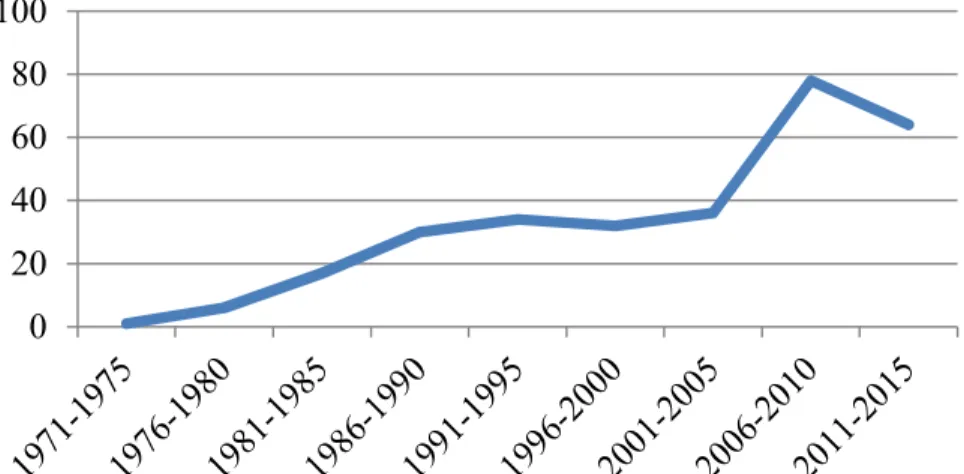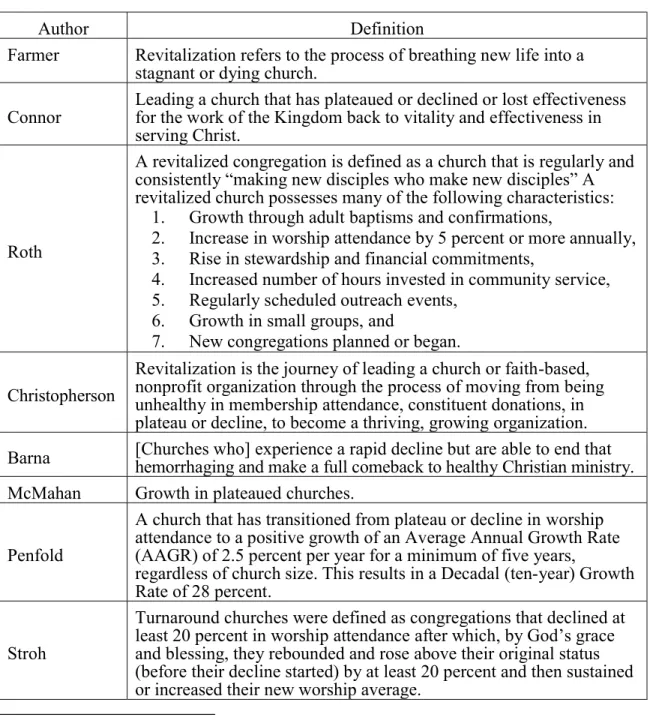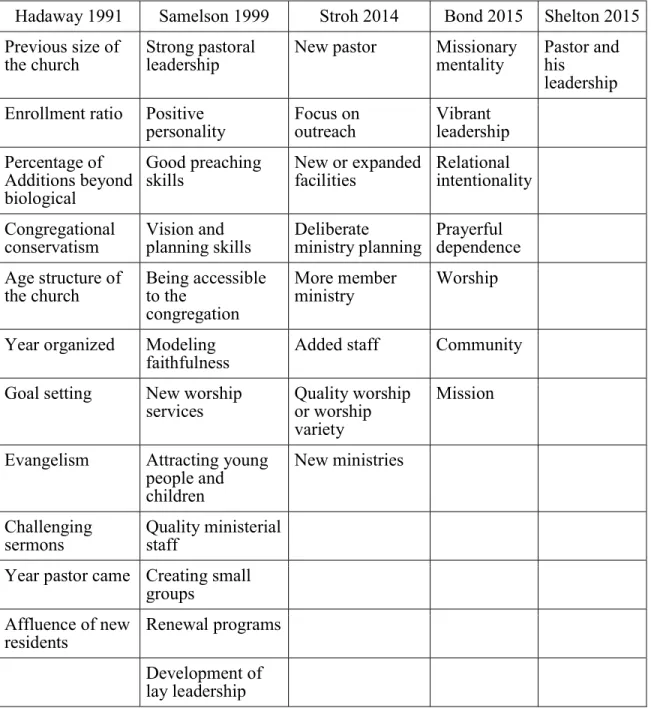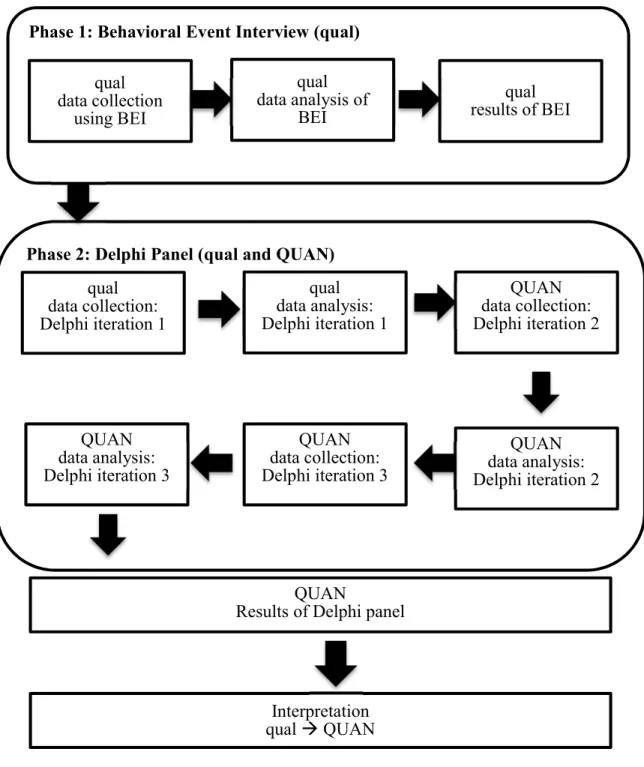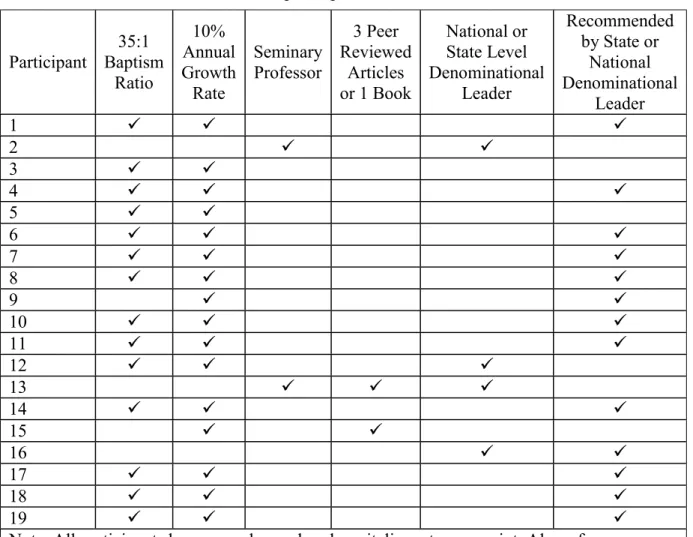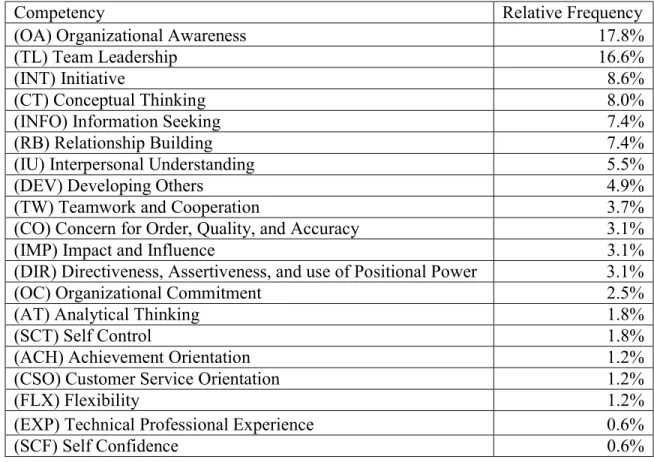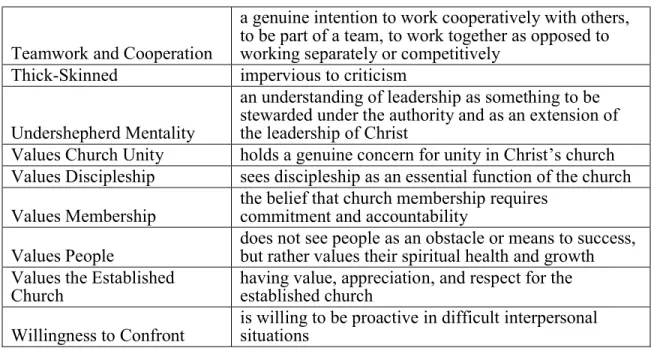I am grateful to my father and mother whose influence made me who I am today. The seed for this project was planted, not in a classroom or library, but when I was a child.
RESEARCH CONCERN
The results of the Delphi panel found in phase 2 were analyzed to develop a competency model. Statistical measures from the Delphic phase of the study were used to validate the competency model.
LITERATURE REVIEW
2Brandon Edward Conner, "Church Revitalization: Insights from the Ministry of the Apostle Paul" (Ph.D. diss., The Southern Baptist Theological Seminary. Second, church revitalization is a testimony of the power of Christ to the church and the world.
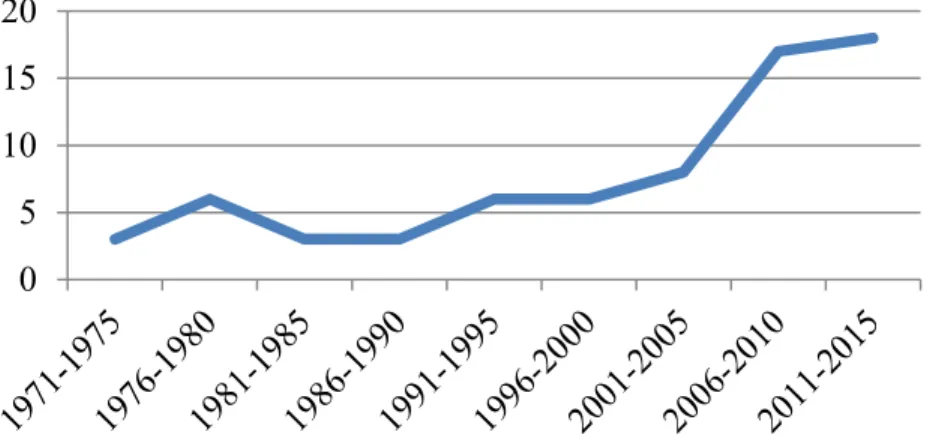
Behavioral Event Interview (qual)
Delphi Panel (qual and QUAN)qual
The competencies coded in the qualitative portion of the research design were added to the data collected from the first iteration of questioning in the Delphi panel. In order to participate in the expert group, participants had to meet at least two of the following selection criteria: (1) serve as a lead or preaching pastor at a church that has fallen flat or been rejected, followed by a period of membership to the baptism (or conversion) relationship of at least serving as a leading or preaching pastor at a church that was. 14 For the purpose of this study, the head pastor is defined as the pastor who does the majority of the preaching for the church.
19 Nineteen participants completed iteration 1 of the Delphi panel, 17 participants completed iteration 2, and 15 participants completed all three iterations. All the experts who participated in the research were checked and their fulfillment of the selection criteria was checked each time. Creswell also suggests that sequential research design often favors the qualitative phase of research.
The design of the study was therefore that the results of the quantitative phase take precedence and that the qualitative results should be secondary.
Qualitative Interviews
As Creswell and Plano Cark note, “The purpose of the two-phase exploratory design is that the results of the first, qualitative method, can help develop or inform the second, quantitative method.”21 This design is used when exploratory design is needed because “ (1) measures or instruments are not available, (2) the variables are unknown, or (3) there is no framework or guiding theory.”22 Additionally, Creswell suggests that this design is useful “to identify variables important to t "was studied quantitatively when the variables are unknown."23. The vast majority of interview time is spent on step 3, the Behavioral Events section. CAQDAS), such as NVivo, are used by researchers to help analyze large amounts of qualitative data.30 Transcripts of BEIs were loaded into the software.
CAQDAS then allowed each coded unit to be grouped by theme, allowing the researcher to easily compare the entire document with the coded and emerging themes. The transcripts of the interviews were coded using the competence dictionary found in Spencer and Spencer.31 However, it was expected that new codes would be developed from the interview material. The presence and frequency of competencies found through the structured interviews are reported in the results section of the study.
Furthermore, these competencies constituted the preliminary list of competencies for the Delphic phase of the study.
Delphi Panel
The second and third iterations of the Delphi survey used a Likert-style instrument so that the data are ordinal. One of the common criticisms of the Delphi method is the lack of standards for how to establish consensus. The data from the transcripts of the BEIs underwent thematic analysis to identify competencies for church revitalization.
The competency dictionary contained in Spencer and Spencer was used; competencies specific to the role of church revival were however uncovered in the analysis of the data.49. The second phase of the study attempted to use a panel of experts to form a competency model. Participants were provided with a description of the research and an informed consent statement to participate in the study.
Due to the nature of the Behavioral Event Interview (BEI) protocol, performance-based selection criteria were used.
Behavioral Event Interviews
Nine participants were removed from the pool for the second phase of the study by their participation in the first phase. Each participant received a report with their ranking (see Appendix 10) as well as the group's average score on each item in the survey. For each item, respondents were given a recommended score that reflected the panel's consensus.
Ten pastors were invited to participate in phase 1 of the research and 8 pastors completed the BEI protocol. Twenty of the 32 pastors and church leaders invited to participate agreed to participate in the expert panel in Phase 2 of the research. Nineteen participants completed iteration 1, 17 completed iteration 2, and 15 participants completed all iterations of the Delphi panel.
See Tables 6–9 for demographics of participants who completed all iterations of the Delphi protocol.

Iteration 1 asked participants 5 open-ended questions about the competencies the experts felt were important for a pastor who was leading a church to
Bible teaching has the ability to clearly communicate and apply Scripture to individual congregational contexts. Contextual skills the ability to understand the pastoral context and adapt ministry effectively to a given context. Counseling the ability to provide assistance and guidance to individuals with personal difficulties or decision-making.
Empathy is the ability to be aware of and sensitive to the feelings, thoughts and experiences of others. Communication the ability to clearly relate information, ideas and feelings to a person or group of people. Understand the ability to hear accurately and understand the unspoken thoughts, feelings and concerns of others.
Strategic Planning the ability to develop a church strategy and plan for the future Technology Skills the ability to use technology effectively.
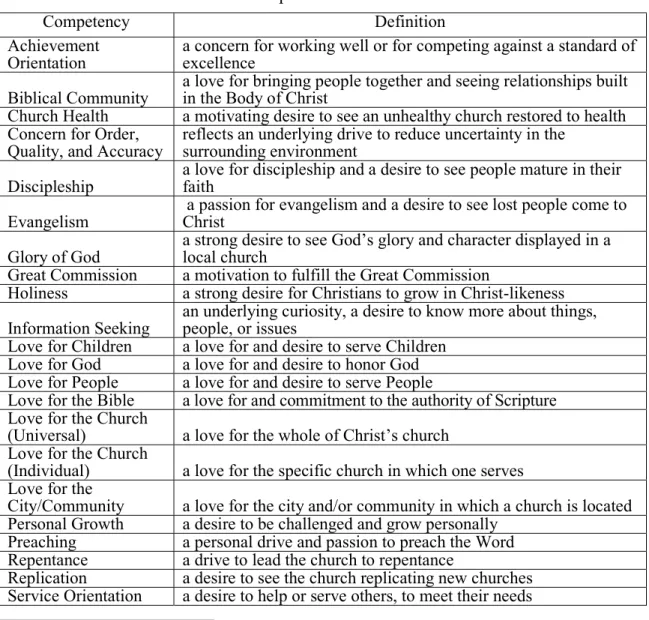
In iteration 2 of the Delphi, the participants were provided with the 129 competencies generated in round 1, and asked to rate each competency using a 1-5
Problem Solving Ability to identify and resolve problems or difficulties Vision Demonstrating the ability to communicate the vision in such a way that others. In Delphi iteration 2, participants were provided with the 129 competencies generated in round 1, and asked to rate each competency using a 1–5 scale. 19 Cronbach's alpha is a measure of reliability commonly used to test the internal consistency of a questionnaire.
Wright, "Cronbach's Alpha Reliability: Interval Estimation, Hypothesis Testing, and Sample Size Planning," Journal of Organizational Behavior 36, no. Of the 129 competencies rated by the panel of experts in iteration 2, 112 had a consensus score greater than 0.7, indicating a strong level of consensus. The ranges here are based on similar measures of consensus ranging from 0 to 1, such as Kendall's W.
In iteration 3 of the Delphi, participants were again provided with the 129 competencies generated in iteration 1 and asked to rate each competency.
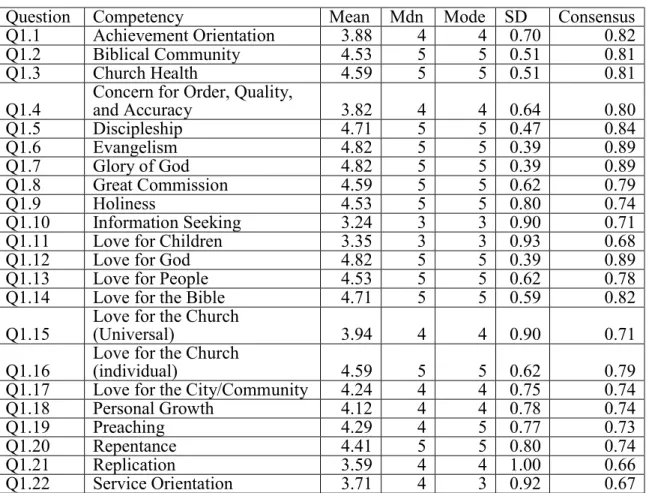
In iteration 3 of the Delphi, the participants were again provided with the 129 competencies generated in iteration 1, and asked to rate each competency
In iteration 2, expert panel members were asked to rate each of the 129 competencies using a Likert-like scale of 1-5, where '1' was not helpful and '5' was essential. Thirty-eight Southern Baptist practitioner experts were asked to contribute their assessment of the competencies required to lead a church toward revitalization. Each competency that emerged through an interview or qualitative research is represented in the 129 competencies used in phase 2 of the study.
Spencer and Spencer suggest that their competency dictionary accounts for 80-98 percent of the competencies in a given model. Many of the competencies listed by the interviewees in phase 1 and the expert panel in phase 2 were grouped within one of the competencies listed in the dictionary. Of the 129 items, 127 scored better than 0.7 on Tastle's consensus metric indicating a high level of consensus.
Part of the Delphi study led to the creation of an initial model that assessed 129 competencies for their importance to successful pastoral leadership for church revival.
CONCLUSIONS
During this study, the data collected in the qualitative part of the study proved to be the most valuable contribution to the model and a useful addition to the current literature. The importance of this competence may be one of the most important achievements of this research. One of the striking things about the biblical qualifications for pastoral ministry is that they are largely skills and knowledge competencies.
The competencies identified as important by the BEI protocol are therefore included in the knowledge and skills category of the model. Finally, the Delphi phase of the study was a quantitative survey of subjective opinions of successful church reformers. An interesting finding was the lack of knowledge competencies on the expert competency list in the Delphic portion of the study.
A formal academic structure may not be the best or most appropriate context for training many of the competencies in the model. Research is also needed to examine current pastoral formation in the light of the competence model. In the second part of the study, practitioners overwhelmingly rated motives and values as the most essential competencies for revitalization.
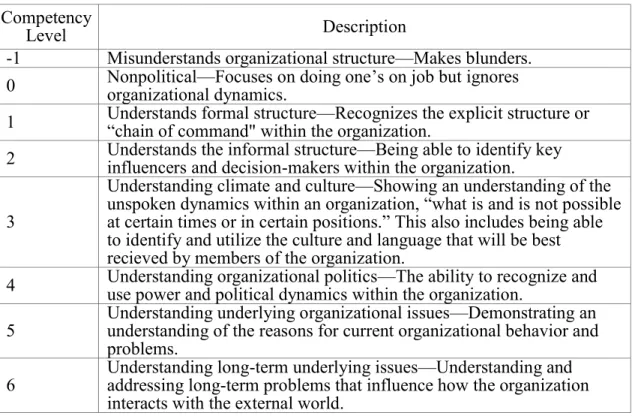
BEI DESCRIPTION
In this research, you will participate in the interview as described in the following paragraphs of this email. Participation in this study is entirely voluntary and you are free to withdraw from the study at any time. By completing this interview, you are giving your informed consent to the use of your answers in this research.
All aspects of your participation in this research will be kept strictly confidential and will not be shared with anyone else. Thank you for your participation in this research that seeks to create a competency model for church revival. In this research you will complete a series of surveys designed to produce a competency model for church revival by building consensus among a panel of experts.
By completing this survey, you are giving your informed consent to the use of your responses in this research.
ROUND 1 SURVEY
In your opinion, what motives, if any, are necessary for a pastor who wants to lead a successful revitalization of the church. If you were to hire or train a candidate to revive the church, what motives would you look for. In your opinion, what qualities, if any, are necessary for a pastor who wants to lead a successful revitalization of the church.
If you were hiring or training a candidate to revitalize a church, what qualities would you look for? What, if any, knowledge do you think is needed by a pastor who wants to lead a successful church revival. If you were hiring or training a candidate to revitalize a church, what knowledge would you look for.
If you were hiring or training a candidate for church revival, what skills would you be looking for?
ROUND 2 SURVEY
This competence is absolutely necessary for the ordinary tasks, situations and challenges of church revival. 3 – Useful: These competencies are not necessary to be an effective pastor/reviver, but are useful traits, skills, or attributes to have for some common revival tasks, situations, and challenges. Community - the love of bringing people together and seeing each other. relationships built in the body of Christ.
Concern for order, quality and accuracy - reflects a. underlying drive to reduce uncertainty in the surrounding environment. discipleship and a desire to see people mature in their faith. The glory of God - a strong desire to see God's glory and character on display in a local church. Universal) - a love for the global community of the Church of Christ. individual) – a love for the specific church one serves.
City/community love – a love for the city and/or community in which a church is located.
